Do you want to embed PDFs, spreadsheets, and other types of documents in your WordPress blog posts?
WordPress comes with a powerful content editor that allows you to add and embed all kinds of content. However, it isn’t always clear how to embed files like PDFs and spreadsheets in your blog posts.
In this article, we will show you how to embed PDF, spreadsheet, PowerPoint, and other documents in your WordPress blog posts.
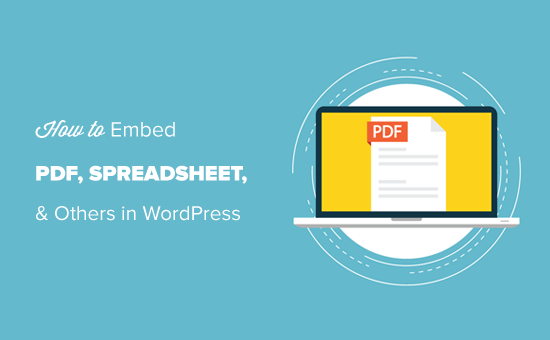
Simply use the quick links below to jump straight to the type of document you want to embed:
Adding PDF in WordPress Blog Posts Without Plugin
WordPress allows you to upload PDFs to your website and then show that file on the page or post. It also adds a ‘Download’ button, so visitors can save the PDF to their local computer.
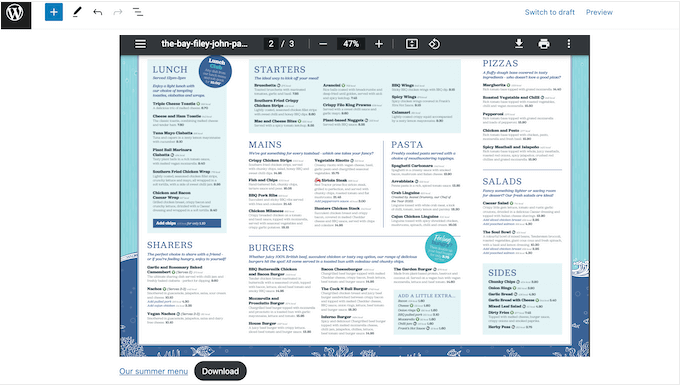
This is a good choice for files that visitors need to keep. For example, you might create a downloadable PDF product catalog or add eBook downloads in WordPress.
To use this method, simply open the page or post where want to add the downloadable PDF and then create a new ‘File’ block.
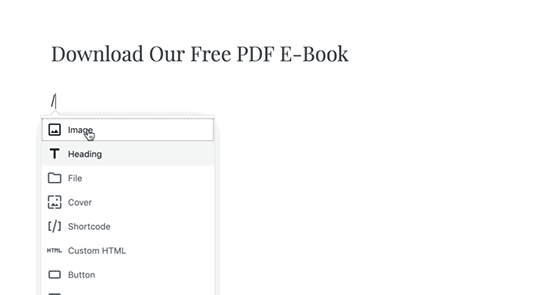
After that, click on ‘Upload’ and choose the PDF file that you want to use.
WordPress will now embed the PDF in the page or post and show its filename along with a ‘Download’ button. To change the file name or the ‘Download’ text, simply click on the text and then make your changes.

If you want to hide the download button, then simply click to disable the ‘Show Download Button’ toggle in the right-hand menu.
You can also use this method to add a downloadable link for other documents, such as Microsoft Word documents, Excel spreadsheets, and PowerPoint presentations. However, the File block won’t show the document content inside your WordPress website, so visitors will need to download the file in order to see it.
Embedding Microsoft Word, Spreadsheet, and Other Documents
Do you want to embed something other than a PDF file? For example, you may want to show a Microsoft Word document, spreadsheet, or PowerPoint presentation on your website.
In that case, we recommend Embed Any Document, as it allows you to embed all kinds of documents. It also integrates with Google Docs Viewer and Microsoft Office Online.
First, you need to install and activate the Embed Any Document plugin on your website. You can follow our guide on how to install a WordPress plugin for more information.
After that, create a new post or open an existing one. Then simply click on the ‘+’ button and find the new ‘Document’ block under the ‘Embeds’ section.
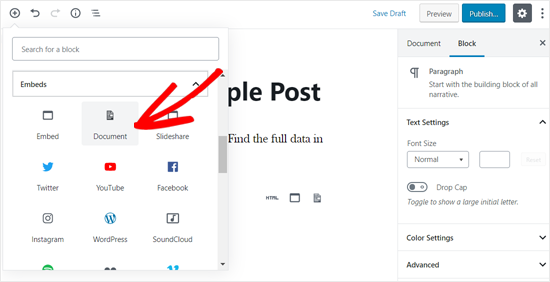
Give it a click to add the block to a page or post.
After that, click on the ‘Upload’ button.

You can now upload a document from your computer.
If the document is published online, then you can select ‘URL’ and then type in the link.
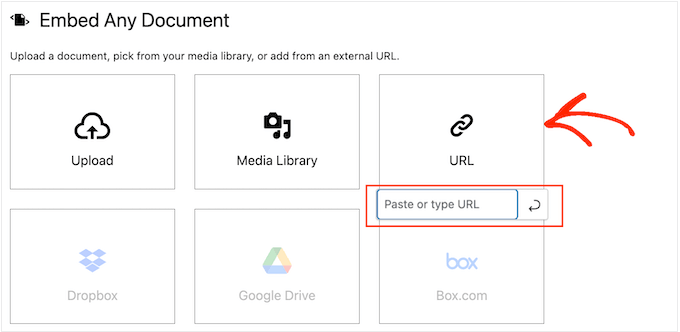
After choosing a document, you’ll see different ways to customize the embed.
These settings are fairly straightforward, so you can look through them and make any changes you want. When you are happy with how the embed is set up, go ahead and click on ‘Insert.’
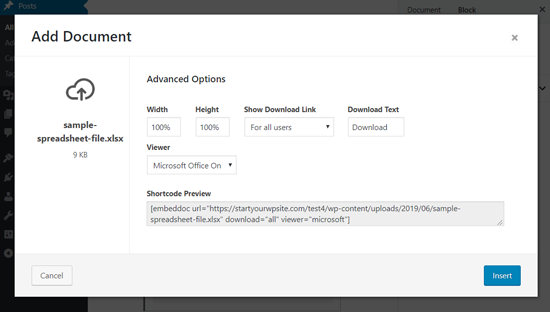
After that, you’ll see the document embedded in the post.
At this point, you may want to look at the document display options in the right-hand menu and make any necessary changes.
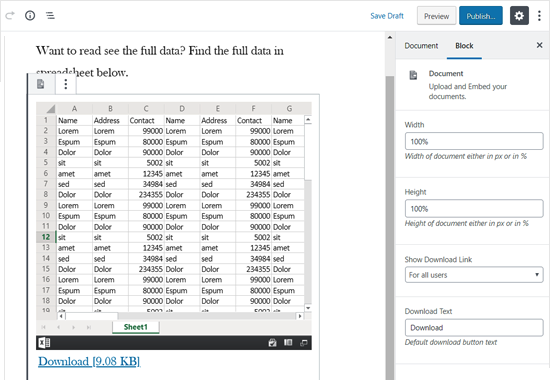
Finally, make the document live by selecting either ‘Update’ or ‘Publish.’
Now if you visit your website, you’ll see the document embedded in the blog post.
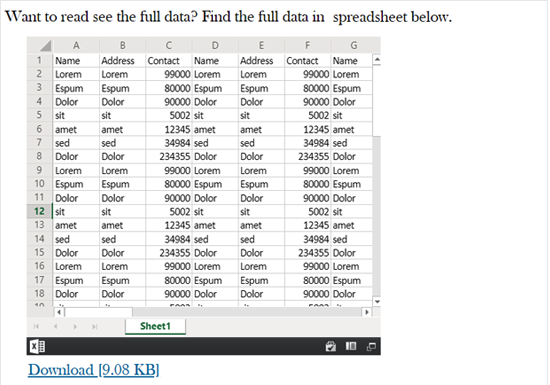
Embedding SlideShare Presentations in WordPress Posts
You can embed some content from third-party websites using the built-in WordPress tools. In particular, WordPress has embed blocks for YouTube videos, Tweets, and SlideShare presentations.
Let’s use SlideShare as an example.
To embed a presentation in your WordPress blog post, create a new post or edit an existing one. Then, simply add a new ‘SlideShare’ block to the blog post.
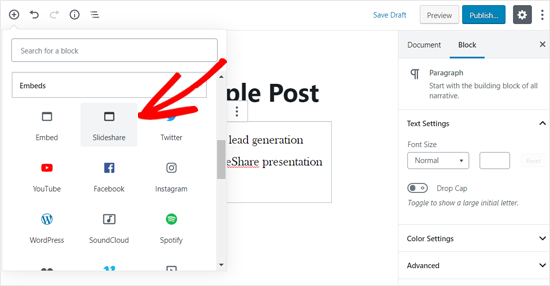
Next, visit the SlideShare website and copy the link for the presentation you want to embed.
After that, paste the link into the embed SlideShare block and click on the ‘Embed’ button.
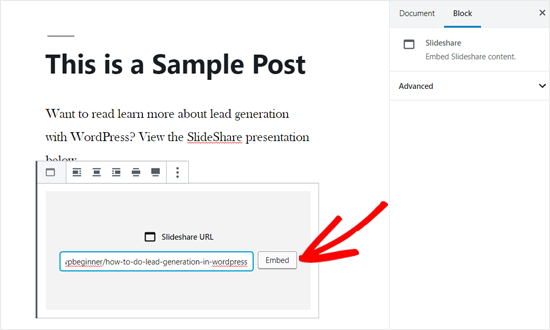
WordPress will now fetch the SlideShare presentation and add it to the post automatically.
You can check the block options in the right-hand menu and then either update or publish the post.
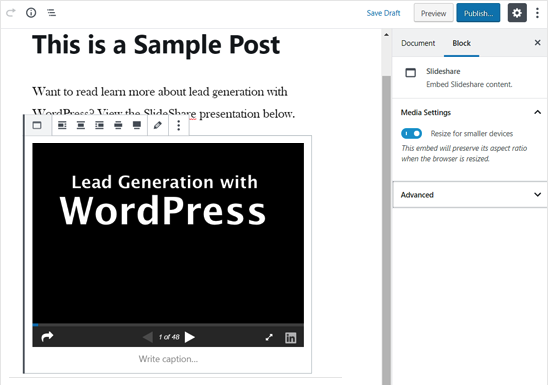
With that done, head over to the blog post to see the SlideShare presentation in action.
To scroll through the different slides, simply use the buttons below the presentation.
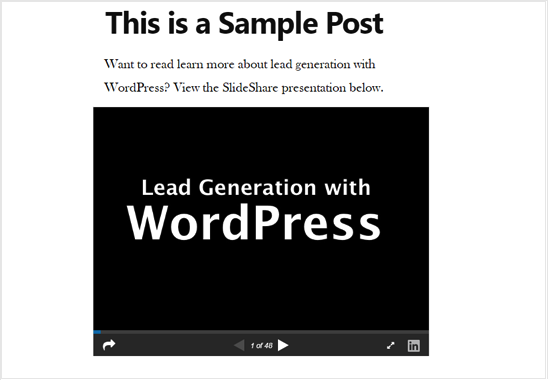
How to Embed Google Docs, Sheets, and Others in WordPress
So far, we’ve shown you how to add PDFs and other documents from your local computer. However, many people use Google Drive to create and store documents online.
You can easily embed Google Drive files in your WordPress posts using the iFrame method.
To embed a Google Doc in WordPress, start by opening the document in your browser. After that, go to the ‘File’ menu and then select ‘Share,’ followed by ‘Publish to web.’
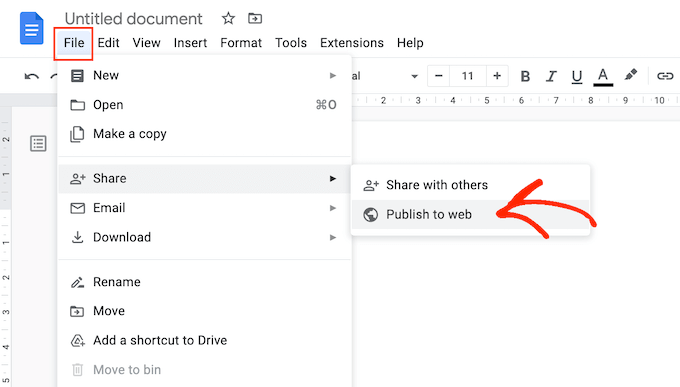
In the popup that appears, select the ‘Embed’ tab.
Then, click on the ‘Publish’ button.
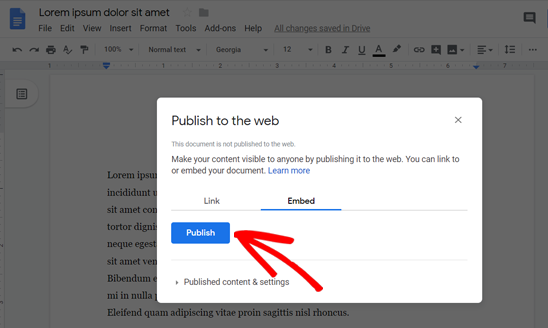
Google Drive will now show a unique iFrame embed code.
You’ll need to add this code to WordPress, so go ahead and copy it.
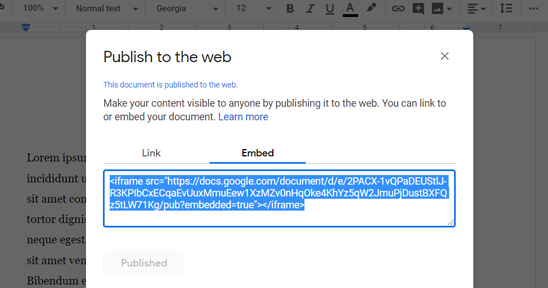
Next, open the post where you want to embed the Google Doc.
You can then click on the blue ‘+’ icon and add a Custom HTML block to the page or post.
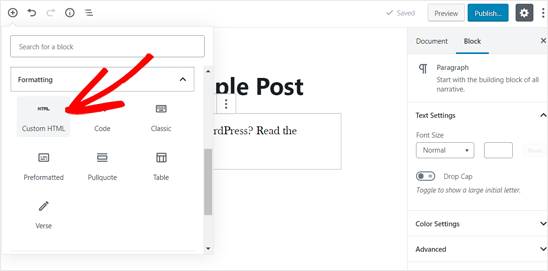
With that done, simply paste the iFrame embed code into the Custom HTML block.
Depending on how you want to display the document, you may need to add height and width parameters to the embed code.
Here’s an example of how these parameters might look:
<iframe src="https://docs.google.com/document/d/e/2PACX-1vQXyRM7bAOY2Em38yYkFKDlFwMp7tlofsdfdgeGDFg4lVkv_9HB_5WbGLwfMScaGQmDf34mIH/pub?embedded=true" width="550" height="600"</iframe>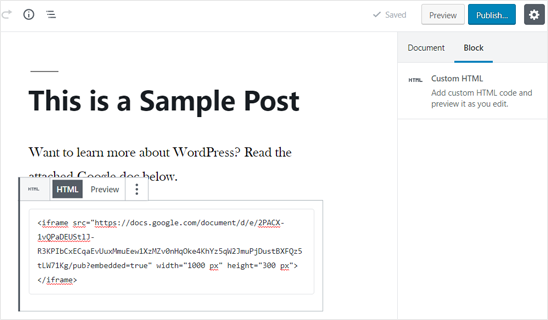
When you are happy with how the code looks, you can save your post and then preview it on your live website.
To embed other documents from your Google Drive, simply repeat the same process described above.
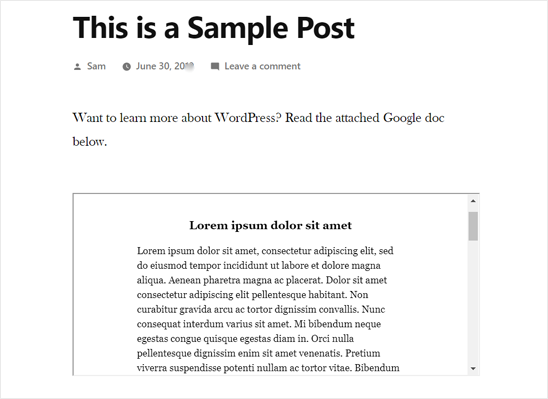
How to Sell PDFs, Spreadsheets, and Other Documents in WordPress
There are lots of ways to make money online blogging with WordPress, but many website owners choose to sell digital documents. For example, you might sell templates for important legal documents like contracts, wills, or tax returns.
If you sell online courses, then you might also create some helpful premium resources like mock exam papers or premium presentations.
Using the methods above, you can share documents for free, but if you want to earn money from your PDF, spreadsheets, and other documents, then we recommend using the Easy Digital Downloads plugin.
Easy Digital Downloads is the best WordPress eCommerce plugin to sell digital documents.
With WordPress and Easy Digital Downloads, you can sell as many documents as you want without paying high transaction fees. This gives it a big advantage over other platforms such as Sellfy, Gumroad, Sendowl, and WooCommerce.
Even better, if you are using SiteGround as your WordPress hosting provider, then Digital Downloads comes pre-installed on your account, so you can start selling digital documents straight away.
For step-by-step instructions on how to sell all kinds of documents, please see our guide on how to sell Google spreadsheets in WordPress.
Track File Downloads in WordPress Posts
If you are embedding downloadable documents, then you’ll want to know how those documents are performing. This is particularly important if you are selling digital downloads or using downloads to collect the visitor’s contact information and grow your email list.
By tracking your downloads, you can see which type of files are the most popular with your visitors. This allows you to offer similar content to visitors in the future and get even more downloads on your WordPress website.
The easiest way to track file downloads is by using MonsterInsights. It’s the best WordPress Analytics plugin and allows you to see detailed reports in Google Analytics.

You can get started with the MonsterInsights Lite version, as it includes everything you need to track file downloads.
However, if you upgrade to the MonsterInsights Pro version, then you can see the most popular downloads inside your WordPress dashboard, along with other advanced reports.
First, install and activate the MonsterInsights Lite plugin on your website. For more details, please see our guide on how to install a WordPress plugin.
Next, you’ll need to connect your WordPress site with Google Analytics. With MonsterInsights, you can make the connection without writing any code or hiring an expert.
For detailed step-by-step instructions, please see our guide on how to install Google Analytics in WordPress.
Once you’ve added Google Analytics to your website, MonsterInsights will start tracking file downloads automatically.
If you’re using the MonsterInsights Pro version, then you can see your reports by going to Insights » Reports in the WordPress dashboard. Then, select the ‘Publishers’ tab.
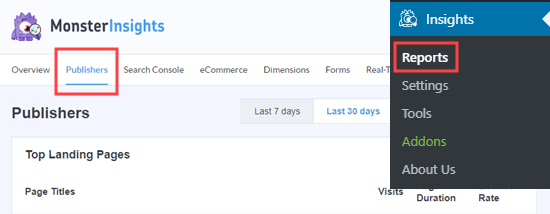
After that, simply scroll to the ‘Top Download Links’ report to see which files are getting the most downloads.
By creating more of this top-performing content, you should be able to increase the total number of downloads on your website.
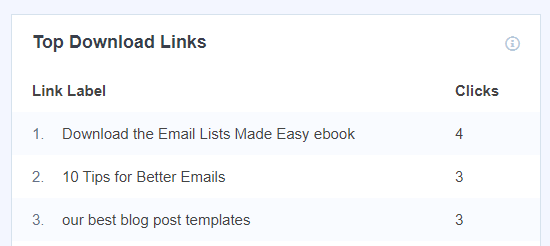
MonsterInsights tracks all the popular file types by default. However, you can track more files by changing the MonsterInsights settings.
For more details, you can check out our guide on how to manage, track, and control file downloads in WordPress.
We hope this article helped you to learn how to embed PDFs, spreadsheets, and other documents in WordPress posts. You may also want to go through our guide on how to create a file upload form in WordPress and the best WordPress membership plugins.
If you liked this article, then please subscribe to our YouTube Channel for WordPress video tutorials. You can also find us on Twitter and Facebook.

